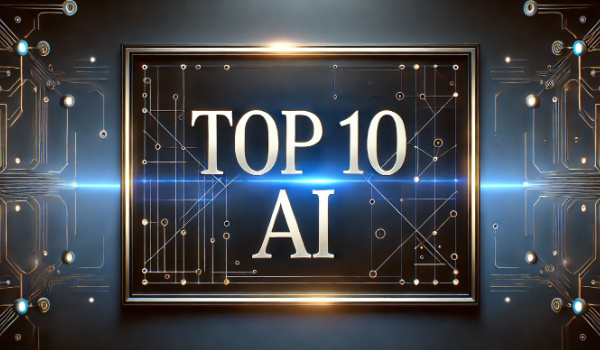The week of March 1 to March 7, 2025, was marked by significant developments in artificial intelligence (AI), reflecting its expanding influence across various sectors. From corporate advancements and strategic shifts to regulatory considerations and ethical debates, these events underscore AI’s transformative impact on technology, security, and society.
Also, as we were researching this info for this weekly post, Chat GPT 4.0 froze up on us multiple times. As those of you in the industry may know, there are some newer versions of this technology that have recently been released to the public. We have found them to perform well in previous research requests, but today, as we write this column, freeze freeze glitch glitch (technically speaking). That said, we still were able to create an excellent overview for you of the prior week’s important events in AI. Check it all out below…
Key Highlights:
-
U.S. Considers Banning DeepSeek on Government Devices: The White House is contemplating restrictions on the Chinese chatbot app DeepSeek due to national security concerns, potentially prohibiting its use on government devices.
-
AI-Enhanced Drones in Ukraine: AI-powered drones in Ukraine are achieving target accuracy rates of 70-80%, significantly higher than human-operated systems, indicating a shift in modern warfare tactics.
-
Microsoft Develops In-House AI Models: Microsoft is creating its own AI reasoning models, aiming to reduce reliance on OpenAI and potentially offer these models to developers in the future.
Now let’s dive into the week’s top 10 stories. And we MAY not publish next week, and if not, we will be back th e
1. U.S. Considers Banning DeepSeek on Government Devices
The White House is considering measures to restrict the Chinese chatbot app DeepSeek from government devices due to national security concerns. Officials are apprehensive about how DeepSeek handles user data, which is stored on servers in China, and the lack of transparency regarding data usage and access. Potential actions include banning the app from U.S. government devices, removing it from U.S. app stores, and limiting U.S.-based cloud services from providing DeepSeek’s AI models. This move echoes previous actions taken against apps like TikTok over similar concerns.
2. AI-Enhanced Drones in Ukraine
In the ongoing conflict in Ukraine, AI-enhanced drones have become a game-changer, achieving target accuracy rates of 70-80%, significantly higher than human-operated systems. These semi-autonomous drones are currently used for final-approach navigation, improving their success rates. Ukraine has acquired approximately 10,000 AI-enhanced drones in 2024, aiming to reduce casualties by replacing human soldiers with uncrewed systems. Despite not yet achieving full autonomy, these drones require less skill from operators, better evade electronic warfare, and reduce the number needed for missions.
(AI&Finance Disclaimer – we are only reporting this AI-related news, not endorsing any political affiliation or opinions about this war)
3. Microsoft Develops In-House AI Models
Microsoft is developing its own artificial intelligence reasoning models to reduce reliance on OpenAI. The company has tested models from xAI, Meta, and DeepSeek as potential replacements for OpenAI’s technology in its Microsoft 365 Copilot. Led by Mustafa Suleyman, Microsoft’s AI division has trained a family of models called MAI, which perform comparably to OpenAI and Anthropic models. Microsoft is experimenting with integrating these MAI models into Copilot and may release them as an API for external developers by the end of the year. This diversification seeks to lower costs and dependence on OpenAI’s GPT-4, initially used in 365 Copilot.
4. Amazon’s AWS Forms New Group Focused on Agentic AI
Amazon’s AWS has established a new group focused on developing agentic artificial intelligence to enhance automation for users and customers. This initiative aims to enable systems to perform tasks independently without user prompts. Swami Sivasubramanian, previously vice president of AI and data, will lead the group, reporting directly to AWS CEO Matt Garman. This effort includes an updated version of the Alexa voice service with such capabilities. Additionally, AWS senior vice president Peter DeSantis announced further internal reorganizations to accelerate innovation, involving repositioning AI groups and hardware engineering under a new compute organization and integrating customer experience and commerce teams.
5. Google Integrates AI-Generated Overviews into Search Engine
Google is incorporating its Gemini 2.0 AI model into its search engine to provide more complex responses, covering areas such as computer coding and math. This enhancement aims to strengthen Google’s competitive edge against rivals like ChatGPT and Perplexity by offering instant expertise. Effective now, U.S. teenage users can access AI overviews without special sign-ins, and an experimental “AI mode” will gradually be rolled out. This mode will yield more conversational overviews, though it may sometimes present inaccuracies. Initially, only Google One AI Premium subscribers can access AI mode. This expanded AI usage also risks more accusations of monopolistic practices, with the U.S. Justice Department recommending penalties, including possibly breaking up Google.
6. Cybersecurity Companies Emphasize AI as Core Future Technology
Cybersecurity companies are increasingly emphasizing artificial intelligence as a fundamental component of their future strategies. Executives from firms like Zscaler, Palo Alto Networks, Okta, and CrowdStrike highlighted AI’s role in enhancing security measures and defending against cyber threats during recent conference calls. For instance, Zscaler’s CEO, Jay Chaudhry, cited AI as a primary factor in the company’s improved financial performance, while Palo Alto Networks’ CEO, Nikesh Arora, stressed the necessity of AI to manage large amounts of data and counter AI-driven attacks. This trend underscores AI’s growing significance in the cybersecurity industry.
7. Hugging Face’s Chief Scientist Expresses Concerns Over AI Development
Thomas Wolf, the chief science officer and co-founder of Hugging Face, has expressed concerns about the current state of AI development. According to Wolf, AI excels at following instructions but lacks the ability to generate new knowledge or revolutionary ideas, acting more as “overly compliant helpers.” Wolf argues that for AI to drive real scientific breakthroughs, it must go beyond retrieving and synthesizing information, questioning its training data, taking counterintuitive approaches, and generating novel ideas from minimal input. Wolf also commented on Dario Amodei’s concept of a “compressed 21st century,” where AI accelerates scientific progress significantly. Although initially amazed by this idea, Wolf ultimately deemed it wishful thinking. He warns that without a shift in AI research, we won’t achieve groundbreaking discoveries, likening future AI to “yes-men on servers.” Meanwhile, there is significant investment in “agentic AI,” which can perform tasks independently and make decisions. Examples of scientific breakthroughs facilitated by AI include Oxford professor Matthew Higgins using AlphaFold2 to solve a key malaria protein’s shape, leading to an experimental malaria vaccine.
8. Meta Accelerates Voice-Powered AI Initiatives
Meta is enhancing its AI voice technology, with plans to introduce advanced voice features in its latest large language model, Llama 4, focusing on natural, conversational interactions. This move is part of CEO Mark Zuckerberg’s goal to establish Meta as a leader in AI, competing with companies like OpenAI, Microsoft, and Google. Meta may trial premium subscriptions for its AI assistant, Meta AI, for specialized tasks and consider advertising within its search results. The company aims to create an AI engineering agent capable of mid-level coding and problem-solving. Meta’s Chief Product Officer Chris Cox highlighted that Llama 4 will enable native speech communication with the internet. The company is also considering adjusting the content regulation of its AI outputs. The push aligns with Meta’s plan to enhance voice command features in products like its Ray-Bans smart glasses, aiming to make them a primary computing device.
- Opening and editing presented by a real live human on the DWN team
- Content synopsized by ChatGPT





